Impact of Micro/Macro Environment on Business Context Report
VerifiedAdded on 2020/10/22
|6
|1182
|453
Report
AI Summary
This report provides a comprehensive analysis of the context of business, focusing on the impact of micro and macro environmental factors on globalized businesses. It identifies key micro factors like suppliers, competitors, and customers, as well as macro factors including economic, political, and technological influences. The report emphasizes the importance of ethical and sustainable management, exploring the reasons why organizations and individuals should prioritize responsible behavior in relation to social, cultural, economic, and environmental issues. It highlights the benefits of ethical decision-making, compliance with corporate social responsibility laws, and the need to address environmental concerns. Furthermore, it discusses the significance of creating employment, maintaining good economic conditions, enhancing reputation, attracting talent, and respecting diverse backgrounds. The conclusion summarizes the key findings, stressing the importance of adapting to the changing business environment and the role of top management in addressing challenges.
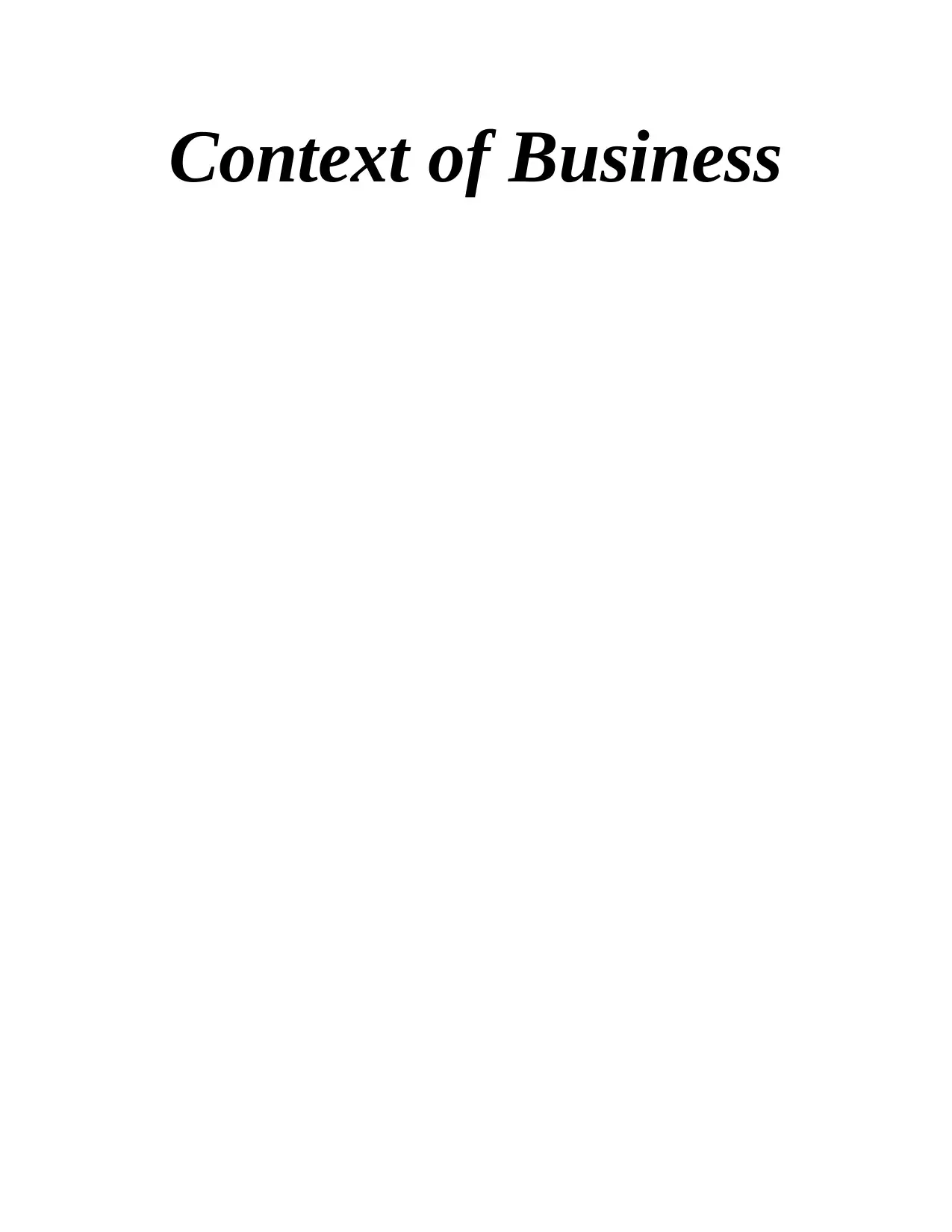
Context of Business
Paraphrase This Document
Need a fresh take? Get an instant paraphrase of this document with our AI Paraphraser

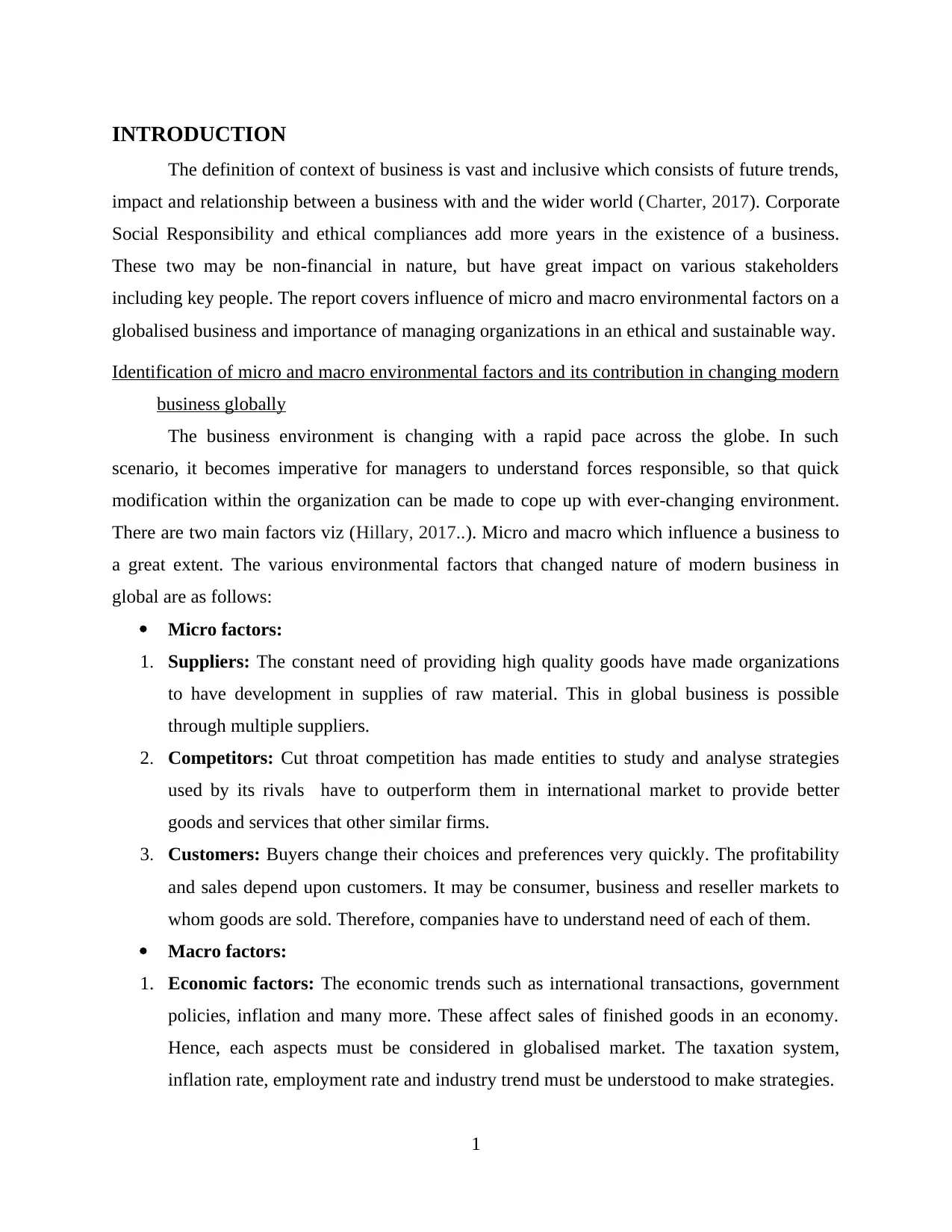
INTRODUCTION
The definition of context of business is vast and inclusive which consists of future trends,
impact and relationship between a business with and the wider world (Charter, 2017). Corporate
Social Responsibility and ethical compliances add more years in the existence of a business.
These two may be non-financial in nature, but have great impact on various stakeholders
including key people. The report covers influence of micro and macro environmental factors on a
globalised business and importance of managing organizations in an ethical and sustainable way.
Identification of micro and macro environmental factors and its contribution in changing modern
business globally
The business environment is changing with a rapid pace across the globe. In such
scenario, it becomes imperative for managers to understand forces responsible, so that quick
modification within the organization can be made to cope up with ever-changing environment.
There are two main factors viz (Hillary, 2017..). Micro and macro which influence a business to
a great extent. The various environmental factors that changed nature of modern business in
global are as follows:
Micro factors:
1. Suppliers: The constant need of providing high quality goods have made organizations
to have development in supplies of raw material. This in global business is possible
through multiple suppliers.
2. Competitors: Cut throat competition has made entities to study and analyse strategies
used by its rivals have to outperform them in international market to provide better
goods and services that other similar firms.
3. Customers: Buyers change their choices and preferences very quickly. The profitability
and sales depend upon customers. It may be consumer, business and reseller markets to
whom goods are sold. Therefore, companies have to understand need of each of them.
Macro factors:
1. Economic factors: The economic trends such as international transactions, government
policies, inflation and many more. These affect sales of finished goods in an economy.
Hence, each aspects must be considered in globalised market. The taxation system,
inflation rate, employment rate and industry trend must be understood to make strategies.
1
The definition of context of business is vast and inclusive which consists of future trends,
impact and relationship between a business with and the wider world (Charter, 2017). Corporate
Social Responsibility and ethical compliances add more years in the existence of a business.
These two may be non-financial in nature, but have great impact on various stakeholders
including key people. The report covers influence of micro and macro environmental factors on a
globalised business and importance of managing organizations in an ethical and sustainable way.
Identification of micro and macro environmental factors and its contribution in changing modern
business globally
The business environment is changing with a rapid pace across the globe. In such
scenario, it becomes imperative for managers to understand forces responsible, so that quick
modification within the organization can be made to cope up with ever-changing environment.
There are two main factors viz (Hillary, 2017..). Micro and macro which influence a business to
a great extent. The various environmental factors that changed nature of modern business in
global are as follows:
Micro factors:
1. Suppliers: The constant need of providing high quality goods have made organizations
to have development in supplies of raw material. This in global business is possible
through multiple suppliers.
2. Competitors: Cut throat competition has made entities to study and analyse strategies
used by its rivals have to outperform them in international market to provide better
goods and services that other similar firms.
3. Customers: Buyers change their choices and preferences very quickly. The profitability
and sales depend upon customers. It may be consumer, business and reseller markets to
whom goods are sold. Therefore, companies have to understand need of each of them.
Macro factors:
1. Economic factors: The economic trends such as international transactions, government
policies, inflation and many more. These affect sales of finished goods in an economy.
Hence, each aspects must be considered in globalised market. The taxation system,
inflation rate, employment rate and industry trend must be understood to make strategies.
1
⊘ This is a preview!⊘
Do you want full access?
Subscribe today to unlock all pages.

Trusted by 1+ million students worldwide
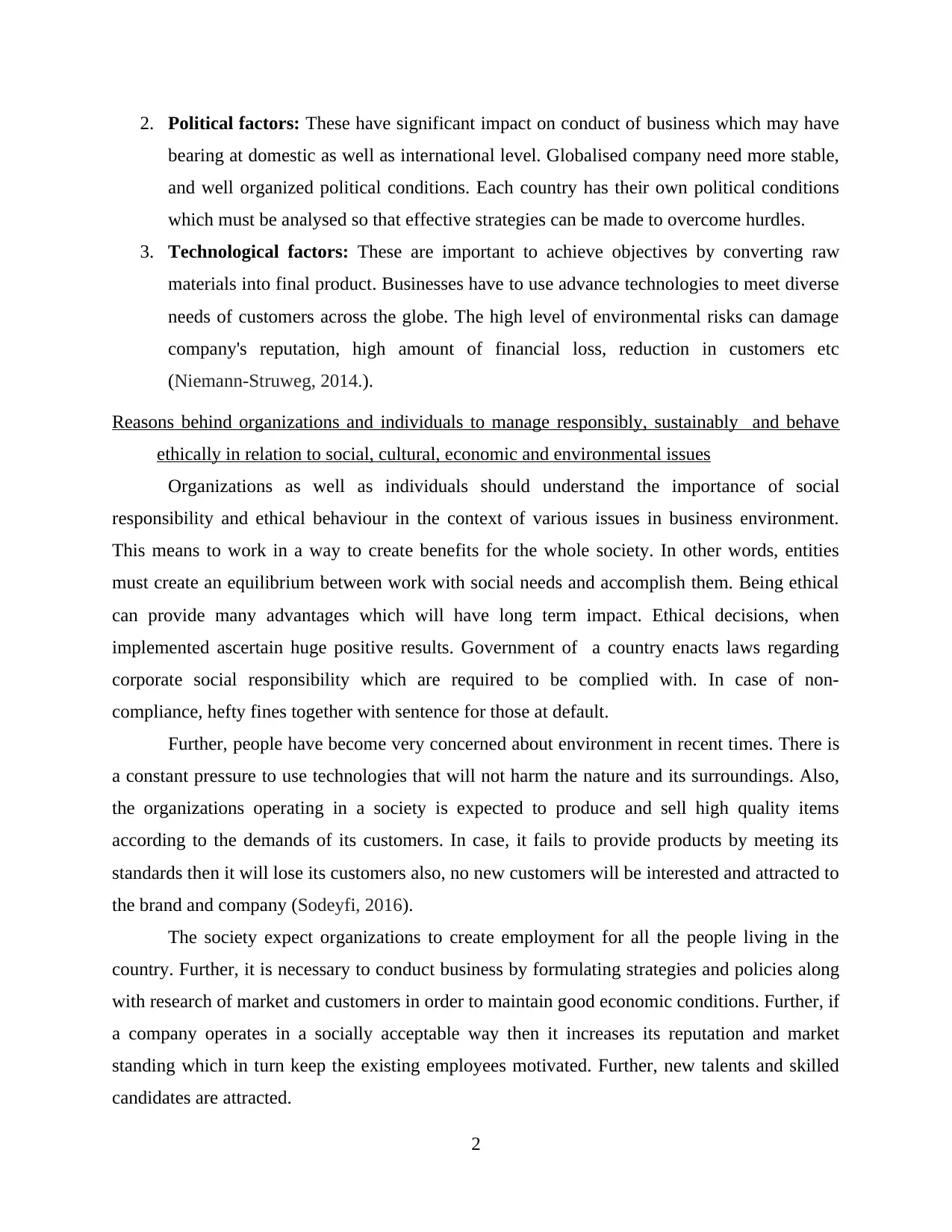
2. Political factors: These have significant impact on conduct of business which may have
bearing at domestic as well as international level. Globalised company need more stable,
and well organized political conditions. Each country has their own political conditions
which must be analysed so that effective strategies can be made to overcome hurdles.
3. Technological factors: These are important to achieve objectives by converting raw
materials into final product. Businesses have to use advance technologies to meet diverse
needs of customers across the globe. The high level of environmental risks can damage
company's reputation, high amount of financial loss, reduction in customers etc
(Niemann-Struweg, 2014.).
Reasons behind organizations and individuals to manage responsibly, sustainably and behave
ethically in relation to social, cultural, economic and environmental issues
Organizations as well as individuals should understand the importance of social
responsibility and ethical behaviour in the context of various issues in business environment.
This means to work in a way to create benefits for the whole society. In other words, entities
must create an equilibrium between work with social needs and accomplish them. Being ethical
can provide many advantages which will have long term impact. Ethical decisions, when
implemented ascertain huge positive results. Government of a country enacts laws regarding
corporate social responsibility which are required to be complied with. In case of non-
compliance, hefty fines together with sentence for those at default.
Further, people have become very concerned about environment in recent times. There is
a constant pressure to use technologies that will not harm the nature and its surroundings. Also,
the organizations operating in a society is expected to produce and sell high quality items
according to the demands of its customers. In case, it fails to provide products by meeting its
standards then it will lose its customers also, no new customers will be interested and attracted to
the brand and company (Sodeyfi, 2016).
The society expect organizations to create employment for all the people living in the
country. Further, it is necessary to conduct business by formulating strategies and policies along
with research of market and customers in order to maintain good economic conditions. Further, if
a company operates in a socially acceptable way then it increases its reputation and market
standing which in turn keep the existing employees motivated. Further, new talents and skilled
candidates are attracted.
2
bearing at domestic as well as international level. Globalised company need more stable,
and well organized political conditions. Each country has their own political conditions
which must be analysed so that effective strategies can be made to overcome hurdles.
3. Technological factors: These are important to achieve objectives by converting raw
materials into final product. Businesses have to use advance technologies to meet diverse
needs of customers across the globe. The high level of environmental risks can damage
company's reputation, high amount of financial loss, reduction in customers etc
(Niemann-Struweg, 2014.).
Reasons behind organizations and individuals to manage responsibly, sustainably and behave
ethically in relation to social, cultural, economic and environmental issues
Organizations as well as individuals should understand the importance of social
responsibility and ethical behaviour in the context of various issues in business environment.
This means to work in a way to create benefits for the whole society. In other words, entities
must create an equilibrium between work with social needs and accomplish them. Being ethical
can provide many advantages which will have long term impact. Ethical decisions, when
implemented ascertain huge positive results. Government of a country enacts laws regarding
corporate social responsibility which are required to be complied with. In case of non-
compliance, hefty fines together with sentence for those at default.
Further, people have become very concerned about environment in recent times. There is
a constant pressure to use technologies that will not harm the nature and its surroundings. Also,
the organizations operating in a society is expected to produce and sell high quality items
according to the demands of its customers. In case, it fails to provide products by meeting its
standards then it will lose its customers also, no new customers will be interested and attracted to
the brand and company (Sodeyfi, 2016).
The society expect organizations to create employment for all the people living in the
country. Further, it is necessary to conduct business by formulating strategies and policies along
with research of market and customers in order to maintain good economic conditions. Further, if
a company operates in a socially acceptable way then it increases its reputation and market
standing which in turn keep the existing employees motivated. Further, new talents and skilled
candidates are attracted.
2
Paraphrase This Document
Need a fresh take? Get an instant paraphrase of this document with our AI Paraphraser
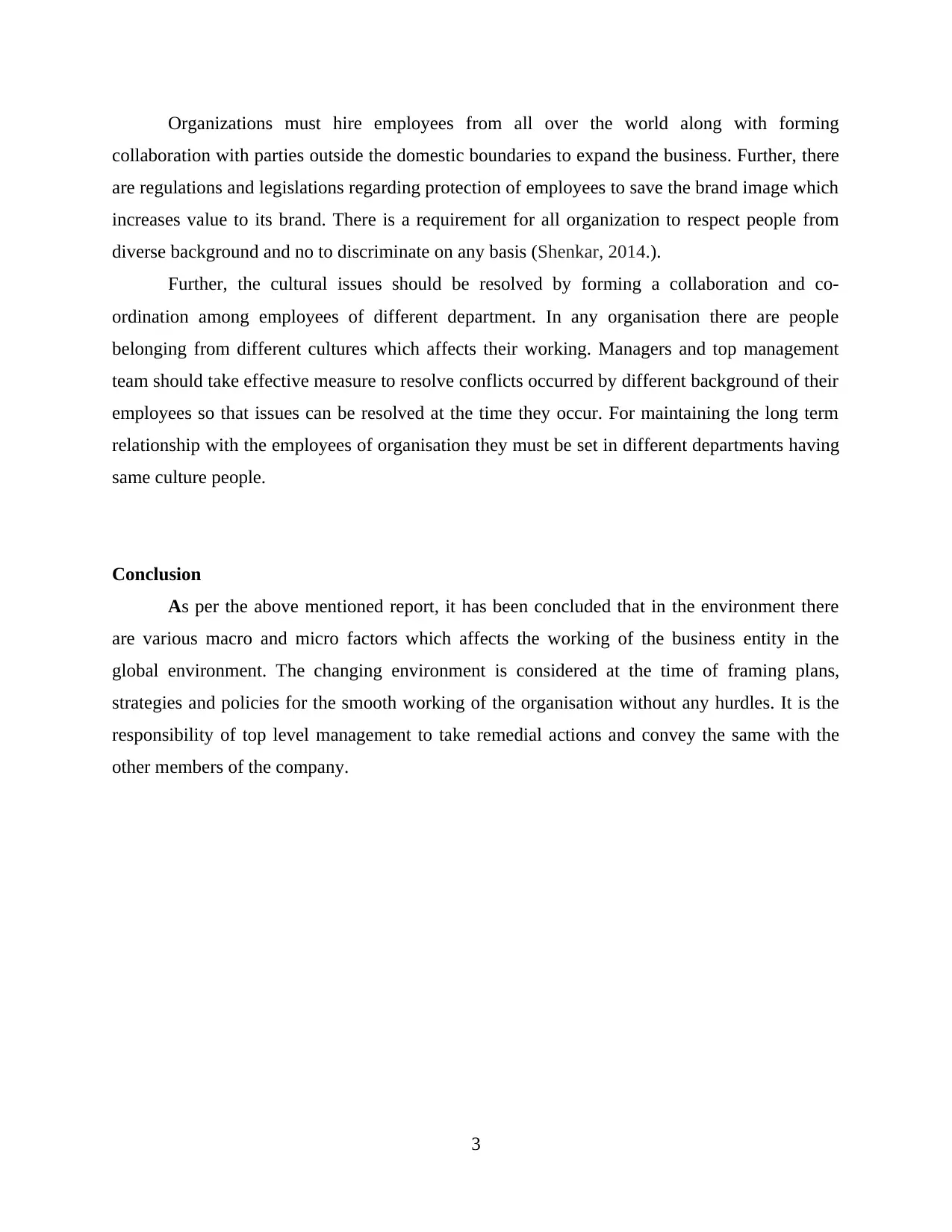
Organizations must hire employees from all over the world along with forming
collaboration with parties outside the domestic boundaries to expand the business. Further, there
are regulations and legislations regarding protection of employees to save the brand image which
increases value to its brand. There is a requirement for all organization to respect people from
diverse background and no to discriminate on any basis (Shenkar, 2014.).
Further, the cultural issues should be resolved by forming a collaboration and co-
ordination among employees of different department. In any organisation there are people
belonging from different cultures which affects their working. Managers and top management
team should take effective measure to resolve conflicts occurred by different background of their
employees so that issues can be resolved at the time they occur. For maintaining the long term
relationship with the employees of organisation they must be set in different departments having
same culture people.
Conclusion
As per the above mentioned report, it has been concluded that in the environment there
are various macro and micro factors which affects the working of the business entity in the
global environment. The changing environment is considered at the time of framing plans,
strategies and policies for the smooth working of the organisation without any hurdles. It is the
responsibility of top level management to take remedial actions and convey the same with the
other members of the company.
3
collaboration with parties outside the domestic boundaries to expand the business. Further, there
are regulations and legislations regarding protection of employees to save the brand image which
increases value to its brand. There is a requirement for all organization to respect people from
diverse background and no to discriminate on any basis (Shenkar, 2014.).
Further, the cultural issues should be resolved by forming a collaboration and co-
ordination among employees of different department. In any organisation there are people
belonging from different cultures which affects their working. Managers and top management
team should take effective measure to resolve conflicts occurred by different background of their
employees so that issues can be resolved at the time they occur. For maintaining the long term
relationship with the employees of organisation they must be set in different departments having
same culture people.
Conclusion
As per the above mentioned report, it has been concluded that in the environment there
are various macro and micro factors which affects the working of the business entity in the
global environment. The changing environment is considered at the time of framing plans,
strategies and policies for the smooth working of the organisation without any hurdles. It is the
responsibility of top level management to take remedial actions and convey the same with the
other members of the company.
3
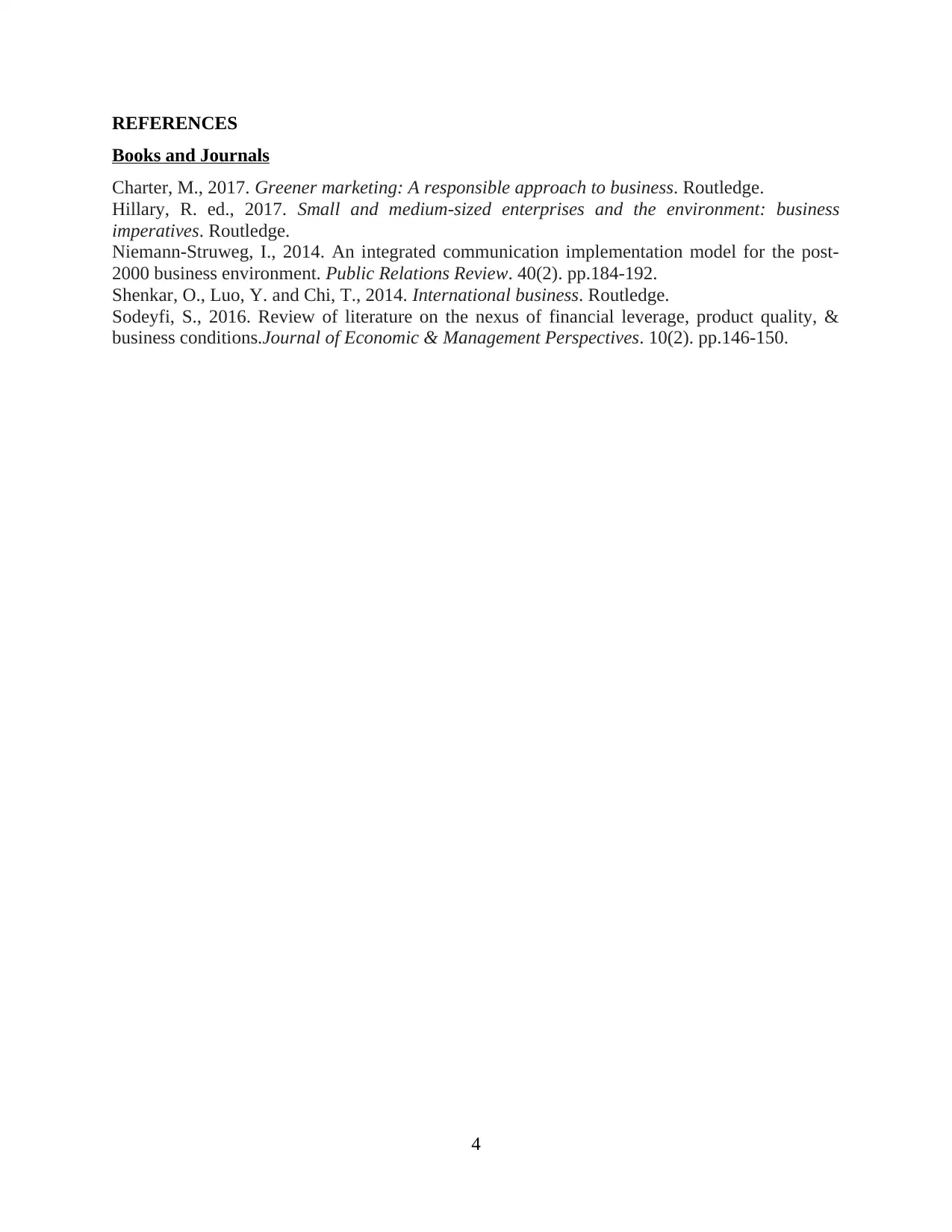
REFERENCES
Books and Journals
Charter, M., 2017. Greener marketing: A responsible approach to business. Routledge.
Hillary, R. ed., 2017. Small and medium-sized enterprises and the environment: business
imperatives. Routledge.
Niemann-Struweg, I., 2014. An integrated communication implementation model for the post-
2000 business environment. Public Relations Review. 40(2). pp.184-192.
Shenkar, O., Luo, Y. and Chi, T., 2014. International business. Routledge.
Sodeyfi, S., 2016. Review of literature on the nexus of financial leverage, product quality, &
business conditions.Journal of Economic & Management Perspectives. 10(2). pp.146-150.
4
Books and Journals
Charter, M., 2017. Greener marketing: A responsible approach to business. Routledge.
Hillary, R. ed., 2017. Small and medium-sized enterprises and the environment: business
imperatives. Routledge.
Niemann-Struweg, I., 2014. An integrated communication implementation model for the post-
2000 business environment. Public Relations Review. 40(2). pp.184-192.
Shenkar, O., Luo, Y. and Chi, T., 2014. International business. Routledge.
Sodeyfi, S., 2016. Review of literature on the nexus of financial leverage, product quality, &
business conditions.Journal of Economic & Management Perspectives. 10(2). pp.146-150.
4
⊘ This is a preview!⊘
Do you want full access?
Subscribe today to unlock all pages.

Trusted by 1+ million students worldwide
1 out of 6
Related Documents
Your All-in-One AI-Powered Toolkit for Academic Success.
+13062052269
info@desklib.com
Available 24*7 on WhatsApp / Email
![[object Object]](/_next/static/media/star-bottom.7253800d.svg)
Unlock your academic potential
Copyright © 2020–2026 A2Z Services. All Rights Reserved. Developed and managed by ZUCOL.




